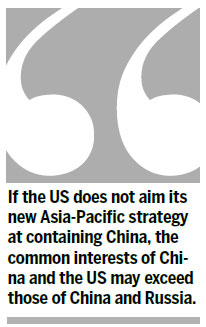The claim by Western media that China is using the Ukraine crisis to form a united front with Russia to confront the US is false
It is not a big surprise that some Western media outlets have portrayed the ongoing Shanghai Cooperation Organization's joint anti-terrorist military drill in Zhurihe as a sign of Russia flexing its muscles with China's support. The Ukraine crisis, which has strained Russia's ties with the West since the end of last year, continues to exert significant influences on the Eurasian geopolitical and geoeconomic pattern.
China is not a direct player in the Ukraine crisis, but it has special relations with the United States, Europe and Russia, and important interests in Ukraine, such as its economic, trade and military cooperation with Kiev.
Some Western media have claimed in an open or obscure manner that "common interests have prompted Russia and China to form a 'united front' against the West, especially the US", and that "China and Russia will join hands more tightly to confront with the US' global strategy and a new 'strategic triangle' like the Cold War-era one is taking shape among China, the US and Russia".
In this context, China's normal cooperation with Russia has been depicted as "immoral support" for Russia.
For example, China's stance that "the Ukraine crisis has its own deep-rooted background" was believed to be in defense of Russia, and China's reiteration of the principle of non-interference in other countries' internal affairs has been interpreted as "inaction" toward "Russia's crime".
At the same time, Western countries have resorted to one of their old tricks by trying to drive a wedge between China and Russia by saying China has exploited the souring of relations between Russia and the West for its own benefit.

In the context of the US-led West strengthening sanctions against Russian energy enterprises, China's increased energy cooperation with Russia and the recent strengthening of energy partnership between the two countries in May was viewed as "China's stronger leverage to acquire Russian natural resources" and Beijing's intentional "wrestling" with the West on the issue of sanction against Russia.
But these views misread the relationship between China and Russia, they also misjudge Beijing's ties with the US and misinterpret its stance on the Ukraine issue.
If China and Russia were driven together by external circumstances and pressures in the first decade after the end of the Cold War, then their relationship in the new era has been driven by intrinsic factors together with some external factors.
Despite their sound cooperation on international issues, both Beijing and Moscow have also paid more attention to bilateral cooperation in the economic and technological areas. Such kind of shift in the cooperation focus has already produced significant influences on the setting of agendas in Sino-Russia ties.
President Xi Jinping and his Russian counterpart Vladimir Putin have regarded the establishment of strategic and cooperative partnership that is mature and comprehensive as a top priority. In this context, strengthening bilateral economic and trade cooperation, which has lagged behind their fast-growing political links, such as cooperation in oil, natural gas, coal, nuclear energy, hydropower and new energy, has become a natural choice for two countries.